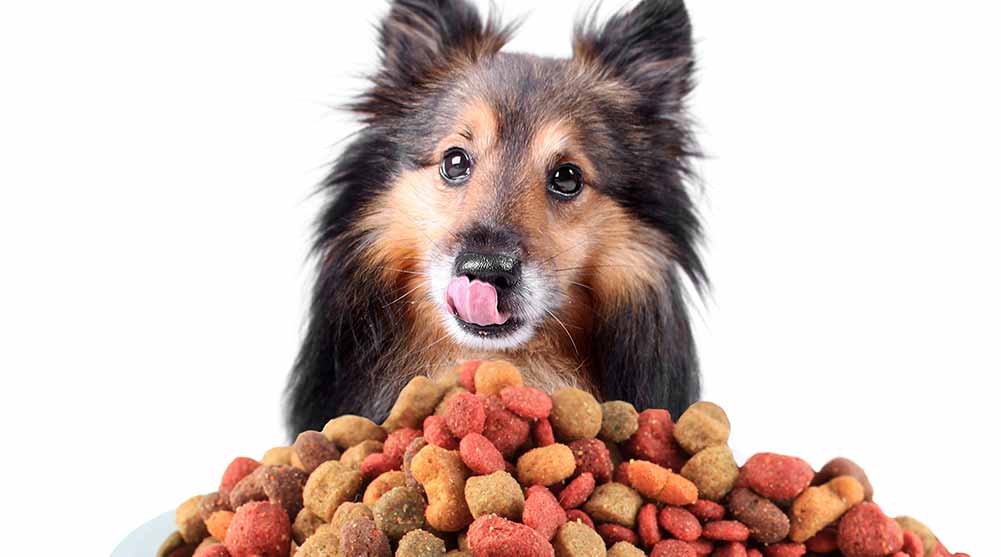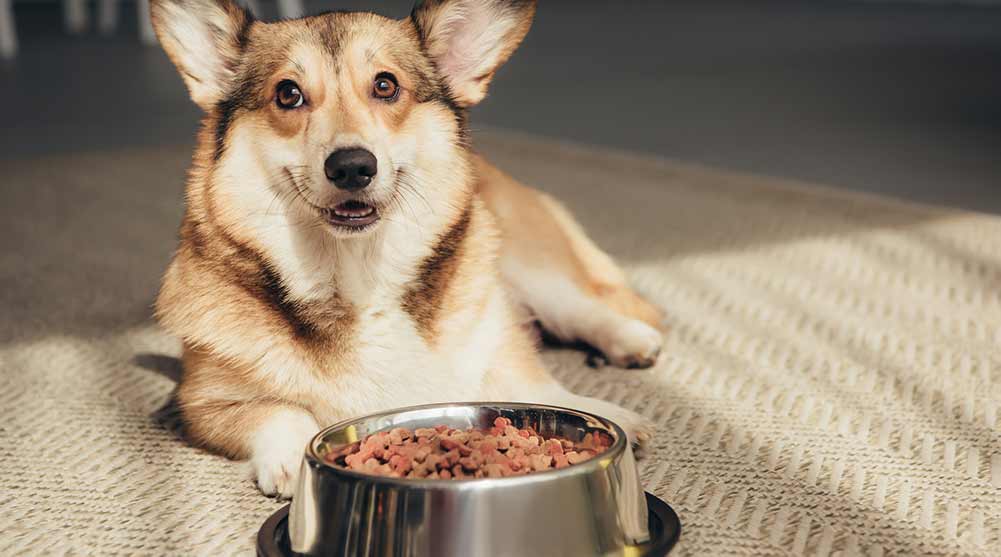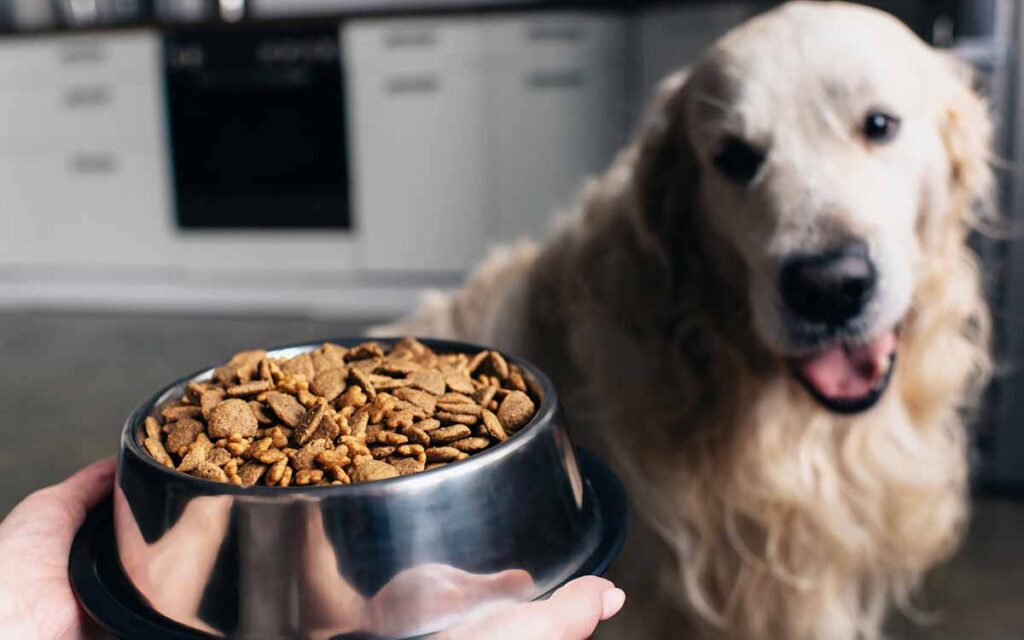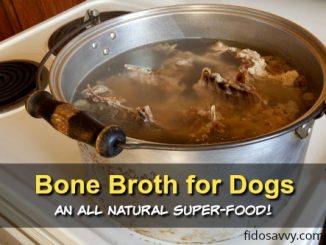This article was updated on January 6th, 2023
Senior dog nutrition is an important part of keeping our older dogs healthy and happy. But simply buying a bag of ‘Senior Dog Food’ won’t cut it!
Elderly dogs are old, but they’re still unique individuals, with a whole range of health problems, activity levels, weight ranges and so on.
Also, remember that dogs age at different speeds. Large and giant breeds can be ‘seniors’ by age seven, while small breeds might still in their prime until ten or twelve years old.
To keep your older dog in tip-top shape and to make sure he’s getting everything he needs (and nothing that he doesn’t need), it’s more important to tailor your choice of food to his specific requirements, rather than to his age.
Surprised? You aren’t the only one. When my first dog entered his senior years I didn’t know this either.
So, I did a lot of research, narrowed down our choices and then instituted some taste-tests (which he thoroughly enjoyed). This resulted in finding food which he loved, and which loved him back.
With my ‘oldie’, it was simple to find food which suited her needs because I had already been around the block a time or two.
On this page I’m going to share what I’ve learned and help you find the perfect senior dog nutrition for your old guy, or gal.
Senior Dog Nutrition – Facts v Fiction
Let’s start by busting some senior dog food myths…
1. ‘Old dogs need low-calorie dog food’ – Not necessarily.
If Fido is already overweight, or is starting to pack on the pounds, then yes he might benefit from a low-calorie formula (along with more exercise and smaller servings). If your dog is at a healthy weight already, a low calorie diet is unnecessary.
2. ‘Senior dogs need low-protein dog food formulas’ – No they don’t.
This one is actually a big ‘not true’ – with a qualifier. Your dog’s protein requirements actually increase with age, because protein helps build/maintain muscle, strengthens the immune system, and supports the central nervous system.
Poor quality protein sources (usually seen as ‘meat meal’ or ‘bone meal’ on the dog food ingredient list) are very difficult for dogs to digest or get any nutritional value from. They put a strain on their major organs.
3. ‘Older dogs benefit from dog food with added supplements’ – Sometimes.
Sometimes they do need supplements… but it can be tricky to know for sure. This isn’t written-in-stone because the value of the supplement depends on the manufacturing process, as well as how much of it is actually added to the food.
The supplements that we’re likely to be interested in for our elderly dogs are things like Omega-3 fatty acids, which are destroyed by most processing procedures.
Fish oils, vitamins, antioxidants, enzymes and other supplements are also often either rendered inactive by the extreme levels of heat used during processing, or aren’t added in high enough quantities. Either way, your dog isn’t going to benefit from them.
4. ‘Senior dogs need a low-fat diet’ – Sometimes
Older dogs only need a low-fat dog food if they have certain health issues… either they’re overweight or have health issues such as pancreatic disease. Certain heart conditions may also lead your veterinarian to recommend a low-fat diet.
Research has shown that most dogs thrive when their diet contains a reasonable level of Omega-3 and Omega-6 fatty acids.
Omega-3 is supplied mostly through fish oils, flaxseed oil and canola oil. Omega-6 is mostly sourced from poultry fat, safflower oil, sunflower oil and vegetable oils such as soybean and corn oil.
How To Choose The Best Food For Senior Dogs
There aren’t any ‘official’ guidelines for dog foods that are marketed as ‘Senior Formulas’. Neither the AAFCO (Association of American Feed Control Officials) nor the NRC (National Research Council) have recognized rules for ingredients, or their ratios.
It’s basically up to each dog food manufacturer to decide what they think constitutes the right balance. That makes the whole process very subjective.
So, how can you be sure you’re buying the right food for your older dog? Let’s take a look…
Most senior dogs who are fairly healthy (and not overweight) just need a diet that has moderate amounts of protein and fats, and is easy to digest. You’re aiming for protein levels of somewhere between 28% and 30%, and fat between 10% and 14%.
In terms of calories, approximately 350 calories per cup is about right.
(Source ~ ‘Your Dog’s Golden Years: A Manual For Senior Dog Care’)
When you’re trying to get the senior dog nutrition balance right, look for dog food which:
- Contains complex carbohydrates which have a low glycemic index, such as whole grains and vegetables
- Contains an above-average percentage of easily-digested protein such as lean meat, offal and eggs
- Contains an moderate amount of healthy fats (10 – 15%)
- Includes essential fatty acids like linoleic and alpha-linoleic acid
- Contains added minerals and vitamins, including zinc, copper, selenium and vitamins A,D,E and K plus B1, 2, 3, 5, 6 and 12. Also folate and biotin.
Also, you need to know that it’s not just what’s IN the food that counts – the QUALITY of those ingredients is crucial too. Look for premium foods that are free from artificial additives, preservatives and chemicals and contain human-grade/organic ingredients.
After that your choice of senior dog nutrition should be mostly based on your dog’s general health.
Senior dogs who are in good general health:
If your senior is in good health, not overweight or underweight, and doesn’t have any digestive problems, then a premium adult formula should work just fine.
The key word here is ‘premium’. Even healthy older dogs are likely to have immune systems which are not as robust as they once were, and major organs which are weaker than in their prime.
Don’t put added strain on their bodies by feeding generic dog food which has little nutritional value and is full of chemicals, additives, preservatives and other ‘junk’!
CLICK HERE to learn more and to see the best food choices for healthy senior dogs.
Older dogs with weight problems:
Carrying too many extra pounds puts a huge strain on an old dog’s heart, not to mention his joints.
Good To Know: Obesity also increases your dog’s chances of developing chronic health conditions such as diabetes. If your dog is diabetic you’ll have other things to think about when picking food.
If Fido is even slightly overweight it’s a good idea to look at lower-calorie formulas, but you still need to make sure that the dog food you choose contains adequate protein.
The aim is to reduce the number of calories your dog is consuming, without losing the benefits of muscle-building protein. Many older dogs have the opposite problem – they’re too thin or can’t gain weight.
So, if this is a problem you want to increase the number of calories by choosing a calorie-dense formula. Don’t forget to maintain adequate protein levels.
Dog Food For Seniors With Health Conditions
If your older dog has a chronic or serious health problem, you need to be careful about what you feed him. The most common older dog health problems are often related to major organs such as the heart, liver, kidneys and brain. There are also skeletal issues such as hip dysplasia, arthritis, or vertebral disc disease, as well as endocrine problems like diabetes, Cushing’s Disease, Addison’s Disease and thyroid problems.
Sometimes your older dog may not want to eat, or his appetite seems to fade away. This might be caused by an underlying health problem too.
And, to round it all off, there’s the reality of an aging body which functions a little less efficiently in most ways. Ugh, the ‘joys’ of maturity!
Optimum senior dog nutrition takes Fido’s individual health issues into consideration. Let’s take a look at the most common conditions, and how they may impact your choice of food:
Diabetes
Diabetic dogs need food which is high in meat-based protein and contains moderate amounts of fat and fiber, as well as low levels of carbohydrates.
* Learn more & see examples HERE
Liver Problems
For older dogs with liver problems you’re looking for food with an above average amount of high-quality protein, plus simple carbohydrates that are easy for Fido’s body to digest.
* Learn more & see examples HERE
Kidney Problems
If your dog’s kidneys aren’t working at full capacity, then it helps to choose food that has reduced levels of phosphorus. Canned (wet) dog food tends to be a bit lower in phosphorus than dry kibble – but you MUST choose a premium quality food.
Heart Disease
The most important thing about choosing food for dogs with heart disease is to pick a low sodium formula. Protein should be in the mid-to-high range, and fats on the moderate to low end of the scale.
* Learn more & see examples HERE
Arthritis & Joint Problems
This could be the trickiest one because the type of supplements that can help creaky joints are destroyed by dog food manufacturing processes, or they aren’t added to formulas in large enough quantities to be useful.
Dietary supplements are often the best route in this case. If you have the time and inclination, feeding Fido a raw food diet can be a great way to make sure he gets what he needs.
The other element of diet that links to arthritis and joint issues is making sure that your dog isn’t overweight because that puts a LOT of extra stress on his bone structure. So, a low calorie food is recommended.
Hormonal, Endocrine & Immune System Diseases
Thyroid problems, Cushing’s and Addison’s disease (adrenal issues) fall into this category (so does Diabetes, but we’ve talked about that already). Look for formulas with lower fiber and carbohydrates, plus moderate to high protein. Avoid grains as much as possible.
Digestive Issues
Older dogs often have challenging digestive systems for all sorts of reasons. Lack of mobility means exercise/activity levels go down and this can cause constipation. Anxiety and pain can cause diarrhea. The reality of an aging digestive system can cause poor nutrient absorption, extra ‘gas’ and so on.
Dog foods which contain probiotics, digestive enzymes and certain vegetables can all help with one, or more, of these tummy problems.
Supplements such as Prozyme, Probiotics or Doc Roy’s Absorb More can all be beneficial for dogs who have trouble digesting their food properly or absorbing enough nutrients.
They also give immune system support as a healthy digestive tract improves immune function.
Bone broth is a fantastic way to boost nutrient intake for older dogs.
Bone broth is a tasty, nutrient-dense, all natural super-food which has a positive impact on many areas of your senior dog’s health. It is super simple to make, easily digested and so tasty that even picky eaters or dogs who are sick or convalescing love it.
Check out this page to find out more… Bone Broth for Senior Dogs
Disclaimer: This website's content is not a substitute for veterinary care. Always consult with your veterinarian for healthcare decisions. Read More.






Is it okay to give my 16 yr old dog who needs more meat nutrients turkey meat? The last time I gave him beef it had a nasty effect at toilet time….
Beef actually isn’t that good for dogs. Chicken and fish are best. Duck is also pretty good for them
Great dog food, my German Shepherd is about 110 pounds she’s also in great shape she loves this dog food. I love to see her face it look like she is 🙂 every time I feed her. Just like to share this suggestion, keep the food nice and dry that will keep bacteria from entering into the food. I use a charcoal container. Also do not store the food outside we are birds and other rodents can get into the container.
Jenny, What food are you feeding your GSD?
My vet says my female 11 yr old GSD weighs 101
Is overweight but it’s winter and she looks fine.